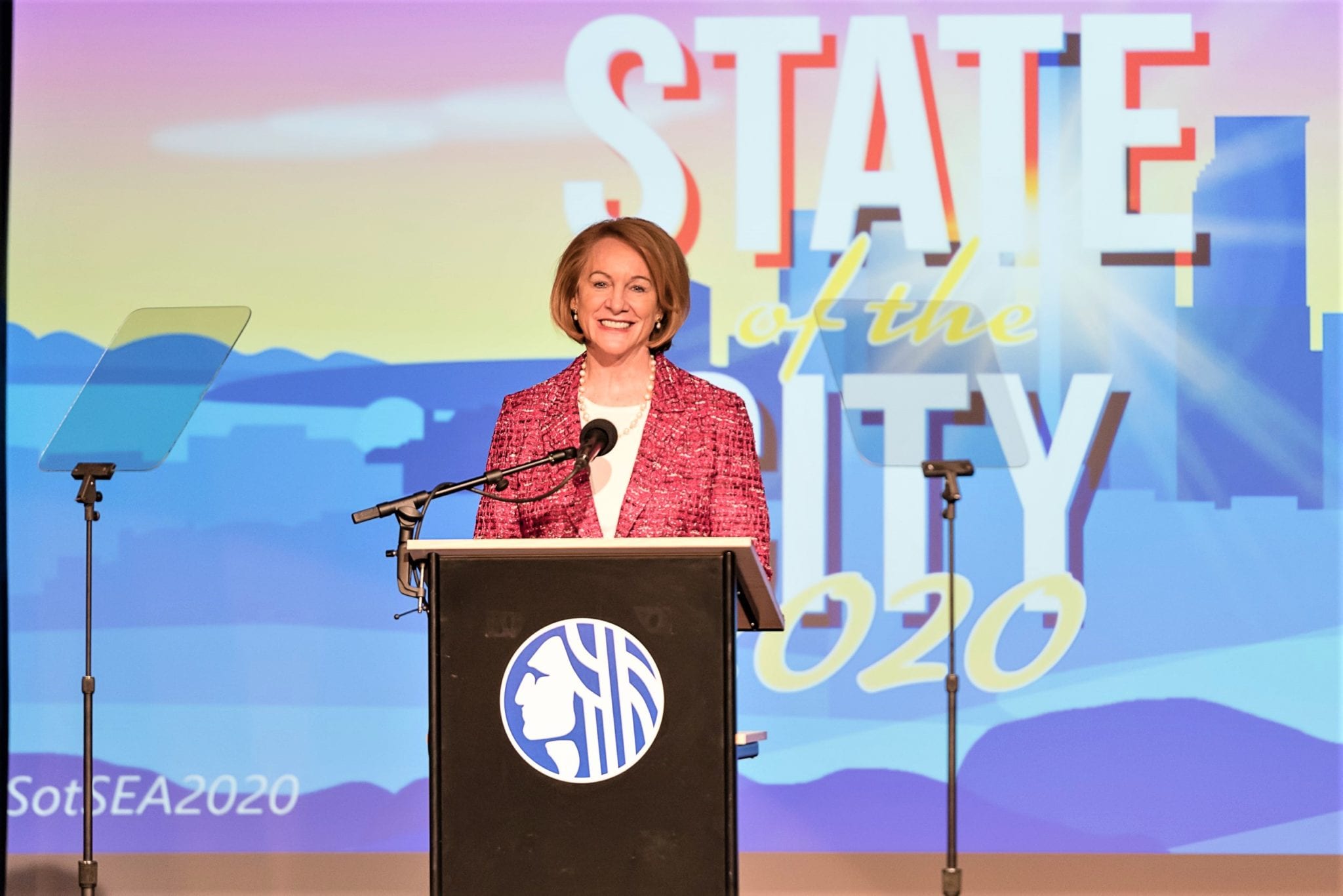
Building on the last two years, Mayor Jenny A. Durkan laid out her vision to continue to act and make progress on our City’s most urgent challenges. Speaking to community members at the Rainier Arts Center, Mayor Durkan outlined her plans to address Seattle’s housing and homelessness crisis, build economic opportunity by connecting young people to free college and jobs, deliver a safer, more just and equitable city, and create a greener city with fewer cars and more transit.
Watch the Speech
Making Meaningful Progress, Together
In addition to highlighting progress that we’ve made on housing, homelessness, and transportation, Mayor Durkan announced a few key items as part of State of the City:
- Mayor Durkan Significantly Expands Seattle Promise Jobs and Career Pathways to Connect Students with Paid Internships with Local Employers and the City of Seattle
- Mayor Durkan Announces Small Business Relief Package to Streamline Permitting Process and Reduce Fees
- Mayor Durkan Announces Expansion of Successful Health One Pilot, Additional Measures to Promote Public Safety
- Mayor Durkan Announces New Efforts to Prepare for 2020 Census
Full Transcript: 2020 State of the City
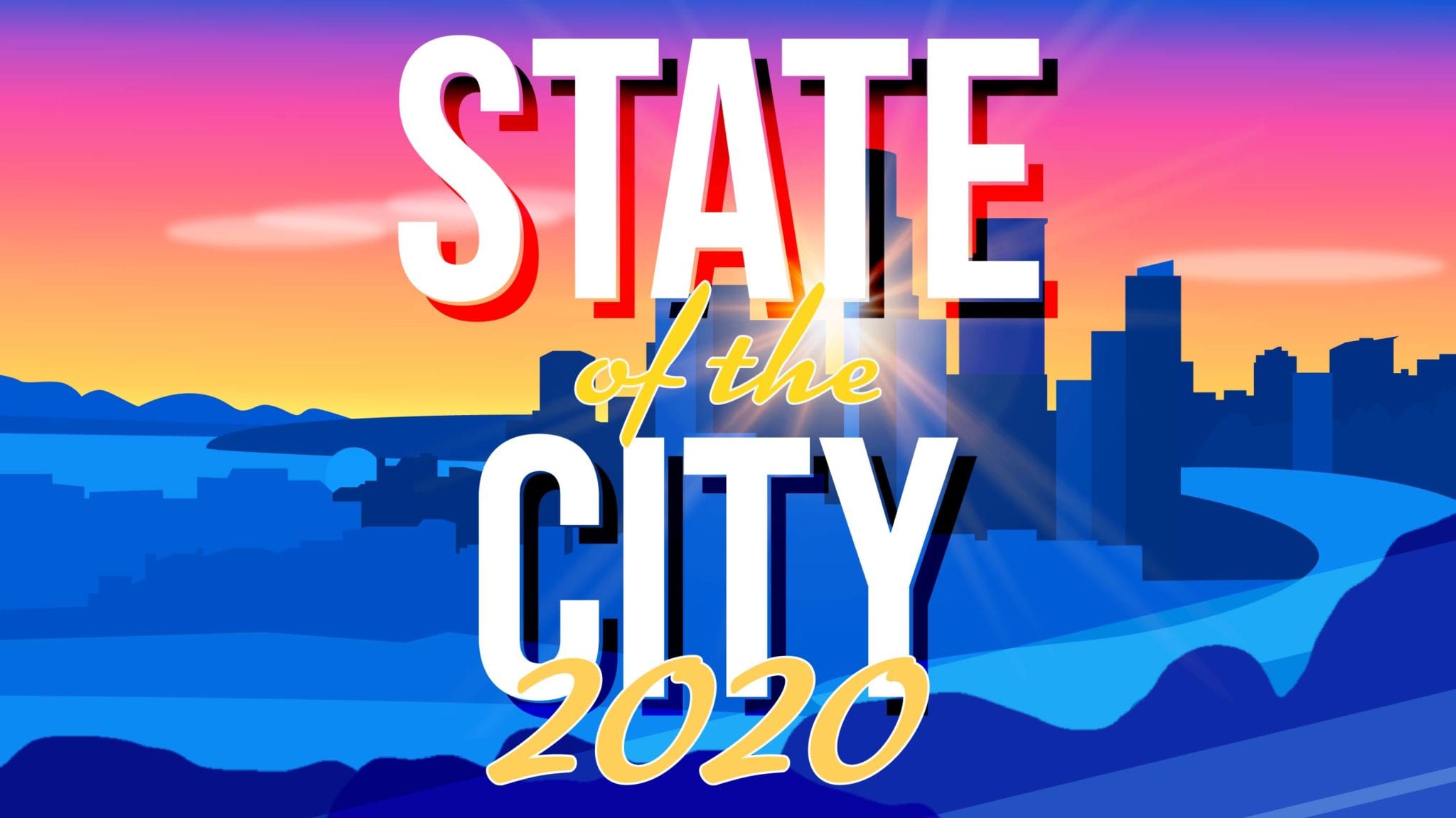
Thank you, Heather. That was a wonderful poem. And thank you Anthony for that introduction and for sharing your story.
I see some future employers here who’d be lucky to have you if you’ve got your resume ready.
Members of the City Council, my fellow elected officials from around the state, veterans, community leaders, members of the clergy, tribal leaders, Cabinet members, and my family and friends – good morning.
Isn’t it great to get out of City Hall?
I think that is the best way to remember why we do our jobs, and it’s the only way we CAN do our jobs:
Getting out of City Hall.
I also want to say a special thank you to our amazing hosts, the Rainier Arts Center team.
This is a special place in Seattle.
Here, you can see Seattle’s amazing young actors perform classics like Les Miserables or The Power of Arts.
This place reflects this community: it is filled with creativity, engaged people, big ideas, and – yes – with lots of love.
Ben wanted me to plug they’re going to remodel and reopen so come back soon!
It shows the power of partnership:
Community, nonprofits, and government working together to make progress on our shared values goals.
Today, that’s exactly what I want to talk about with all of you:
Taking action.
And making progress.
In the last two years, together, we have taken bold actions to make our progressive values real in people’s lives.
Because of our shared actions and commitment, I can tell you today the State of our City is strong and resilient.
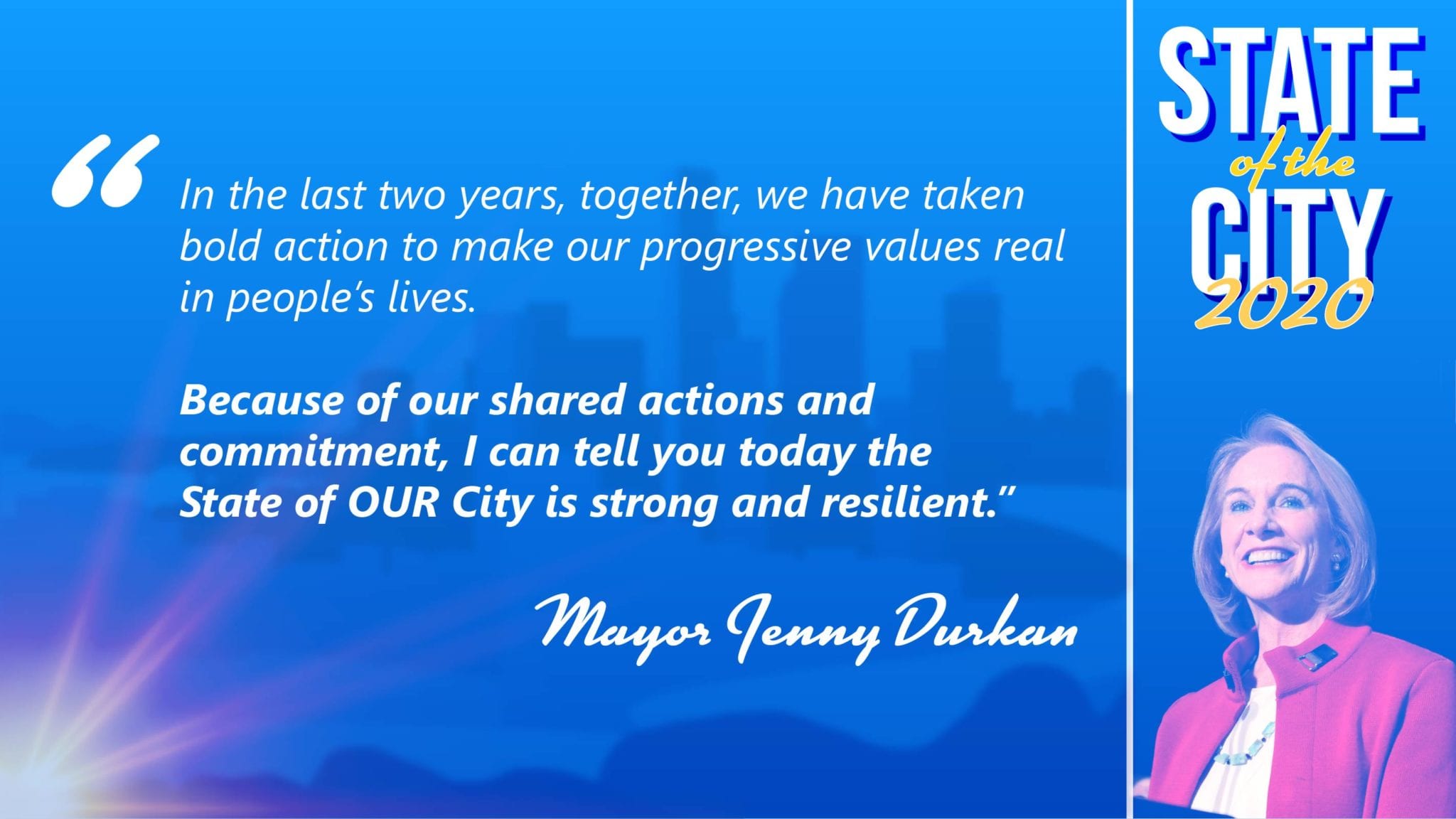
Yes, we have challenges.
But we have the values, the talent, and the determination to meet them.
It is important to remember that progress is rarely easy.
It often means setbacks.
And progress takes the tireless work, commitment, and the vision of remarkable people.
Here in Seattle, we stand on the shoulders of giants.
And one of them is here with us today.
His name is Larry Gossett.
I’d like you to remember, it’s the day of my speech, but it’s also proclaimed Larry Gossett day.
From UW’s Black Student Union days, to his decades of service on the King County Council, Larry always knew who he was fighting for and what he was fighting for.
And we are better because of him.
Larry, thank you for years of friendship – and for your service to Seattle, our region, and our country.
Don’t worry, my friend, we know that none of us are done fighting for justice.
And making progress seems more urgent than ever.
Seattle has grown so quickly that it feels like change happened to us instead of with us.
People are worried about their place in our city and their future for their families.
I hear it everywhere I go.
And our country, it’s at a crossroads.
And it is painfully divided in far too many ways.
In this era of polarization, and the constant chaos spilling out of that other Washington, here in Seattle, we can and we must do better.
While our national politics are mired in acrimony, here in Seattle, we must choose a different path. And we have.
We stepped up to help our most vulnerable communities.
We didn’t just talk about the importance of family.
We expanded access to affordable childcare and high-quality preschool.
We don’t just talk about eliminating inequities.
We listened to the community, and today acknowledge and have taken action on the searing tragedy of missing and murdered indigenous women.
We recognize the ongoing harms of systemic racism, and we’ve broadened the reach of our Race and Social Justice initiative.
We eliminated fines in our Libraries, so income would never be an obstacle to knowledge.
And while others talk about providing new opportunity for young people and preventing crushing student debt, we acted.
We gave two free years college for every Seattle public high school student.
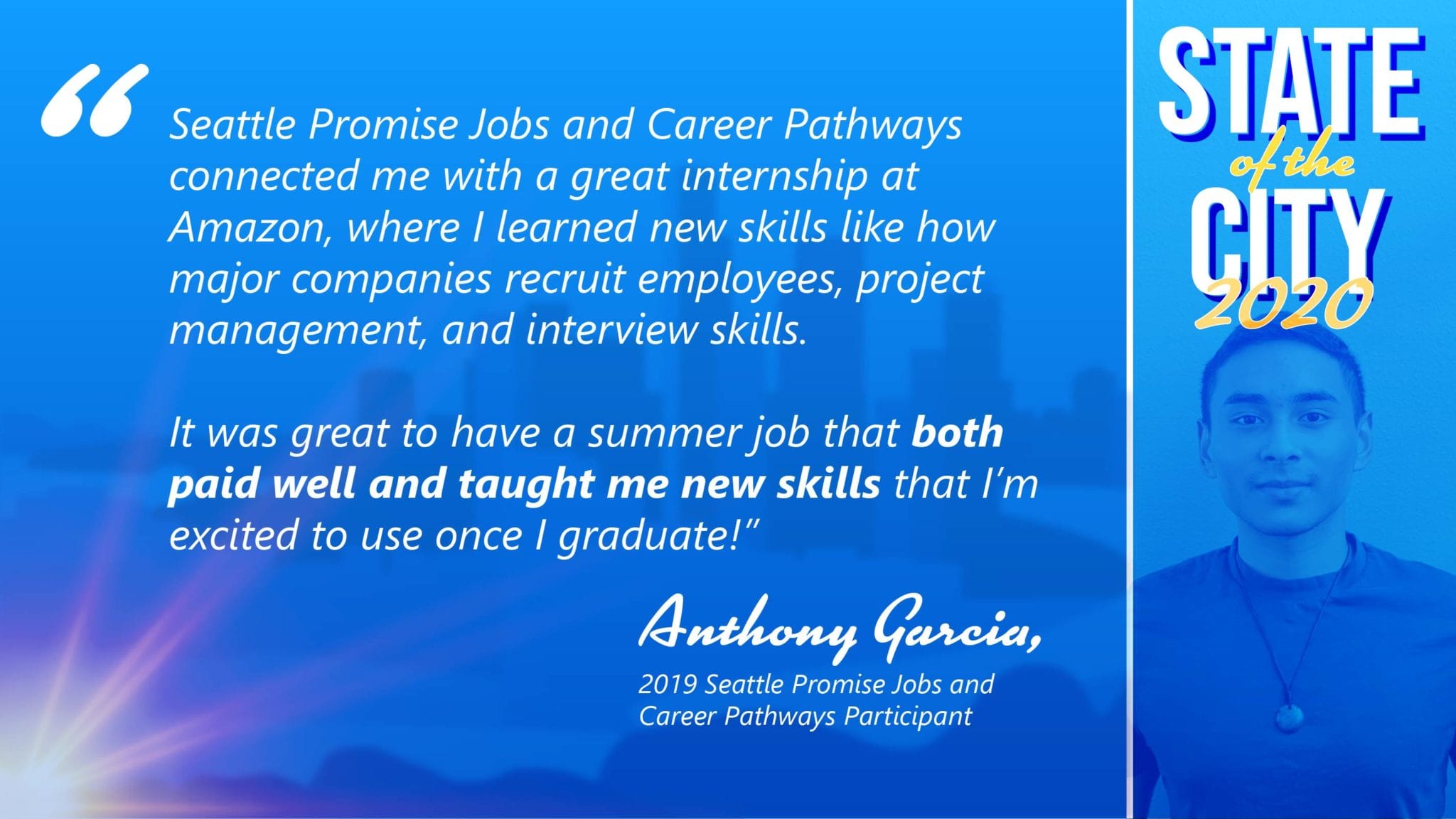
We provided free transit passes to 14,000 students and low-income neighbors so they can have access to jobs, and opportunity, and all of Seattle.
We didn’t just talk about protecting workers.
We gave 30,000 domestic workers new rights, including minimum wage, overtime, and breaks.
Together, we required that our Uber and Lyft drivers earn at least minimum wage.
And we don’t just talk about the need for more housing.
We delivered nearly $1.5 billion in investments in more affordable housing.
As your Mayor, I work every day to translate our progressive values into these real, concrete actions that make peoples’ lives better, safer, and more just.
Now there’s some that said that we couldn’t do it. We couldn’t bring people together to do the big, hard things.
But we have.
We’ve done it together.
In Seattle, we know talk is cheap.
Being progressive means actually making progress. And we have done it. And this year, we have a duty to keep doing just that.
Now we know that government, philanthropy, and employers have a shared responsibility to help our most vulnerable neighbors.
We believe that in a region as prosperous as ours, no one should experience homelessness, and in a region prosperous as ours, everyone should have access to safe and affordable housing.
That’s why we have focused so much energy and action on our homelessness and housing crisis.
This enormous challenge is a generation in the making, and there is so much left to do.
It’s also important to know that, yes, we’ve also made progress.
For the first time since 2012, the annual Point in Time Count showed a decline.
We have transformed our shelter system to one that provides more 24/7 services and a path to housing.
We have provided permanent housing to more people than ever before.
And with our regional partners, particularly with King County Executive Dow Constantine, we are beginning a new era in our fight against homelessness: A more unified regional approach to replace our fractured, siloed system. Thank you, Dow.
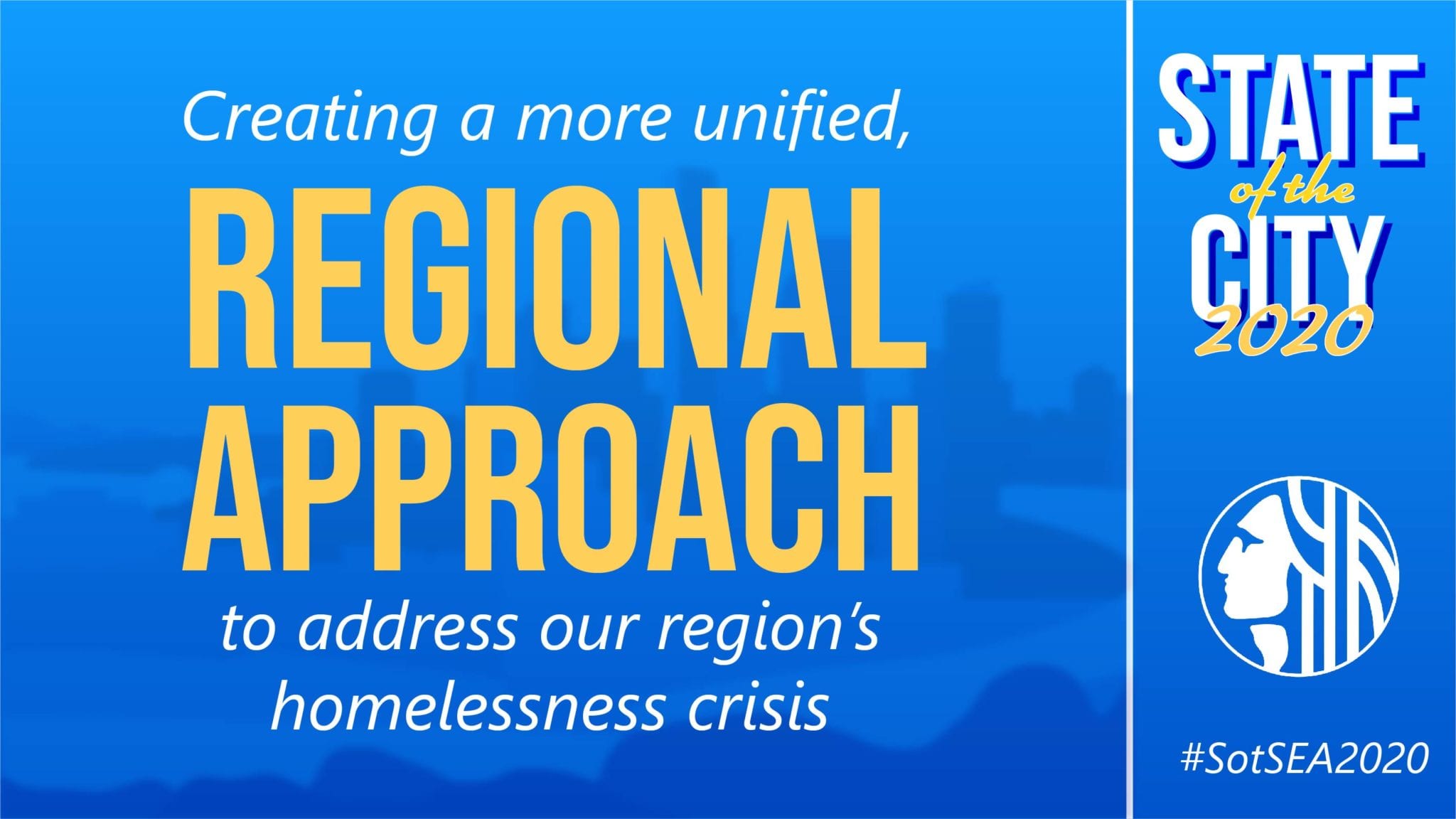
But one truth remains: For both our low income and middle income neighbors, we need more affordable housing in every part of our city and region.
We must do more.
People who work in Seattle should be able to afford to live in Seattle
Just ask Christian Jordan. Christian is a nurse. He works in the neurology operating room at Swedish. Yes, he helps people with brain surgery.
His girlfriend is a surgery technician at Swedish.
They live together in Bremerton, because that’s what they can afford.
But the life-saving facts about our nurses and doctors and medical technicians is that they spend many of days on call, ready to report to work at a moment’s notice.
For Christian and his girlfriend, that means being here in Seattle, near Swedish, ready to go.
And because they live so far away, that sometimes means sleeping in their car.
Or staying on a friend’s couch. Or paying for of a hotel room.
People like Christian – who help care for the people of Seattle – should be able to live in Seattle.
That was for Christian, who couldn’t be here, but would say, “yeah!”
That’s why we took new, unprecedented steps to address our housing challenges.
Together, we passed and implemented Mandatory Housing Affordability. And pushed for more backyard cottages.
We surged our investments in affordable housing for our low and middle income neighbors.
We invested new resources to community-based organizations that are working to combat displacement.
Since becoming Mayor – again – we have invested in nearly $1.5 billion of affordable housing.
$1.5 billion.
Now, that is progress.
But that’s not enough.
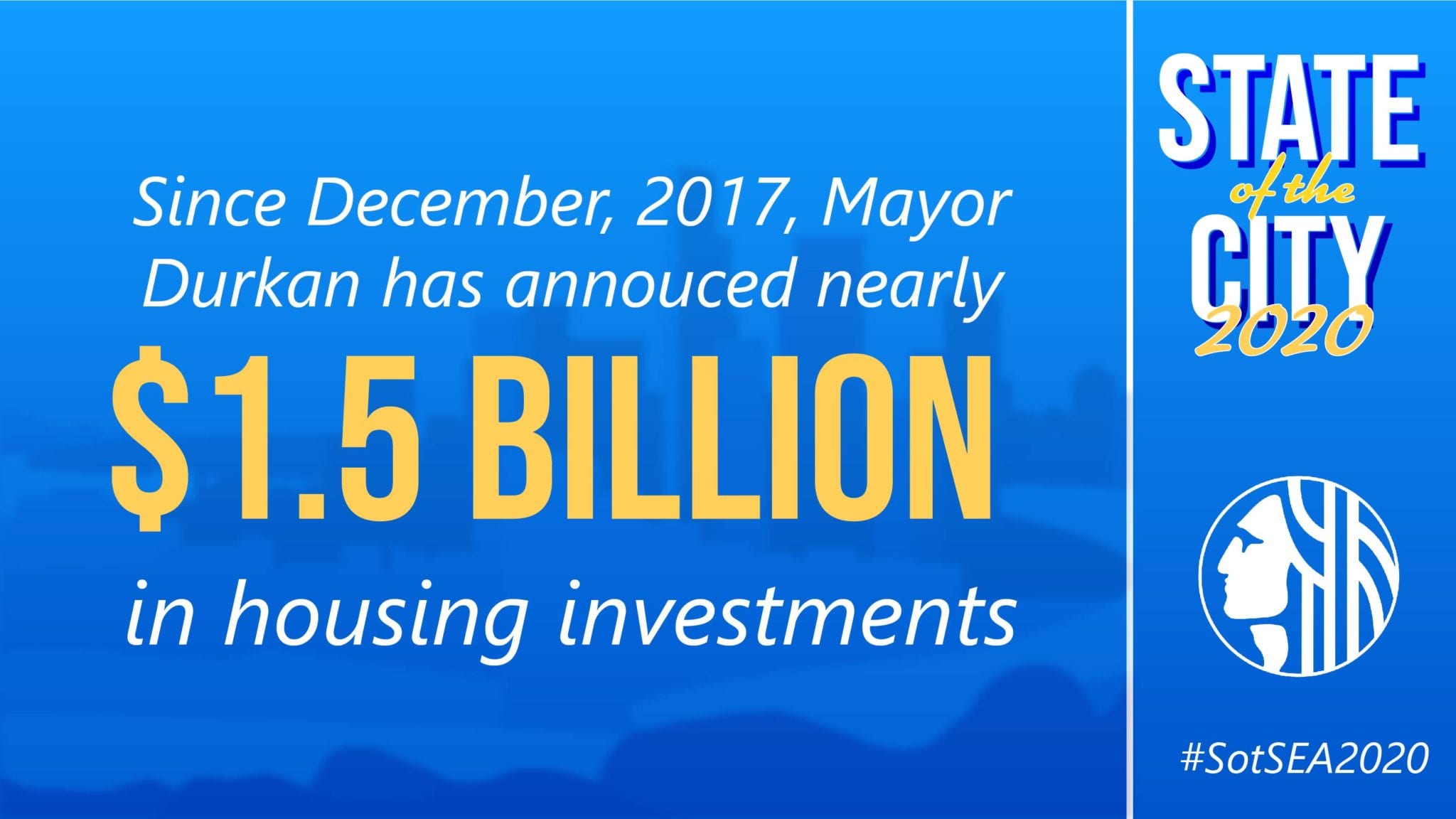
We need more tools as a region.
Seattle cannot and will never solve our affordability, homelessness and housing crisis if we continue to act alone.
From Bellevue to South King County to all over this region, we’ve faced enormous growth in our region, in every city.
While we’ve seen immense prosperity, we’ve seen rising rents and more individuals and families experiencing homelessness.
These problems do not know city boundaries.
If we want to truly address housing and homelessness, we must act as a region.
And at a time that the federal government has walked away from its responsibility, cities need more support for public safety, behavioral health, and homelessness.
Fortunately, legislators in Olympia have been working on a bold idea:
A progressive business tax this could give our region unprecedented new resources for affordable housing.
I stand proudly with a broad coalition of legislators, labor unions, service providers, housing experts and some of our region’s small and large businesses and others who all believe we must solve this problem there is momentum behind a comprehensive, countywide approach.
I hope Olympia acts, and our region does not miss this opportunity for real progress.
Another area where we’ve made progress is treating the people who live and work in this great city as customers and delivering better basic city services.
From keeping people and goods moving through the Seattle Squeeze and the Seattle Freeze.
To making sure your garbage, recycling and compost get picked up.
That you have clean and affordable power. That when you dial 911, someone comes. To filling the potholes.
Okay, yes, I know there are many left to fix, especially this time of year.
And when it snows – whether a half inch or fourteen inches – or when the summer smoke comes again, we are making sure we are prepared, we will communicate with you, you will know what we are doing, and that we will keep you safe.
We are also making progress in creating a Seattle economy that works for everyone.
It is not easy: We are living through transformative change in our economy and it’s leaving too many people behind.
Growing economic inequality is a threat to everyone’s future.
We’ve taken real action to create an economy that works for everybody in Seattleite – and to create more ladders into the middle class.
We started early – with childcare.
We doubled our children program so even more parents and children have the support they need.
Just think about what it’s means for Diamond Davis.
Diamond’s got a six-year-old son who had been in childcare at a Tiny Tots Center. I get to go there later this afternoon
Diamond had been getting help with the cost of childcare through a state.
Then Diamond found out she wasn’t eligible anymore.
This could have been devastating.
Except we, together, the City of Seattle, acted to ensure she had another option: Our Child Care Assistance Program.
Diamond’s son is where he needs to be: in great childcare.
And Diamond can go to work knowing her child is in a safe, nurturing place.
Because we wanted to make sure kids in Seattle could come to kindergarten ready to learn, we also made sure more families had access to high-quality pre-k.
And we also created two years of free college – the Seattle Promise. Because we believe in our youth and we believe in our students.
Today, because we acted and have been working with Seattle Public Schools as partners, we’ve made real progress. Today, 400 Seattle Promise students are attending one of the Seattle Colleges. 400 students.
And as of the application deadline last Friday, 1,800 high school seniors applied for Seattle Promise for next year.
That is astonishing.
In two years, we have provided opportunity to hundreds of families.
Now, we must pair that opportunity with family-wage jobs and full access to our economy and prosperity
Anthony, we’re going to do it for you and for everyone else. You heard Anthony talk about the internship program we created.
That gives students the chance to have paid – yes, paid – internships at some of Seattle’s most innovative companies and labor unions, gain some experience, and they get to work toward their career goals.
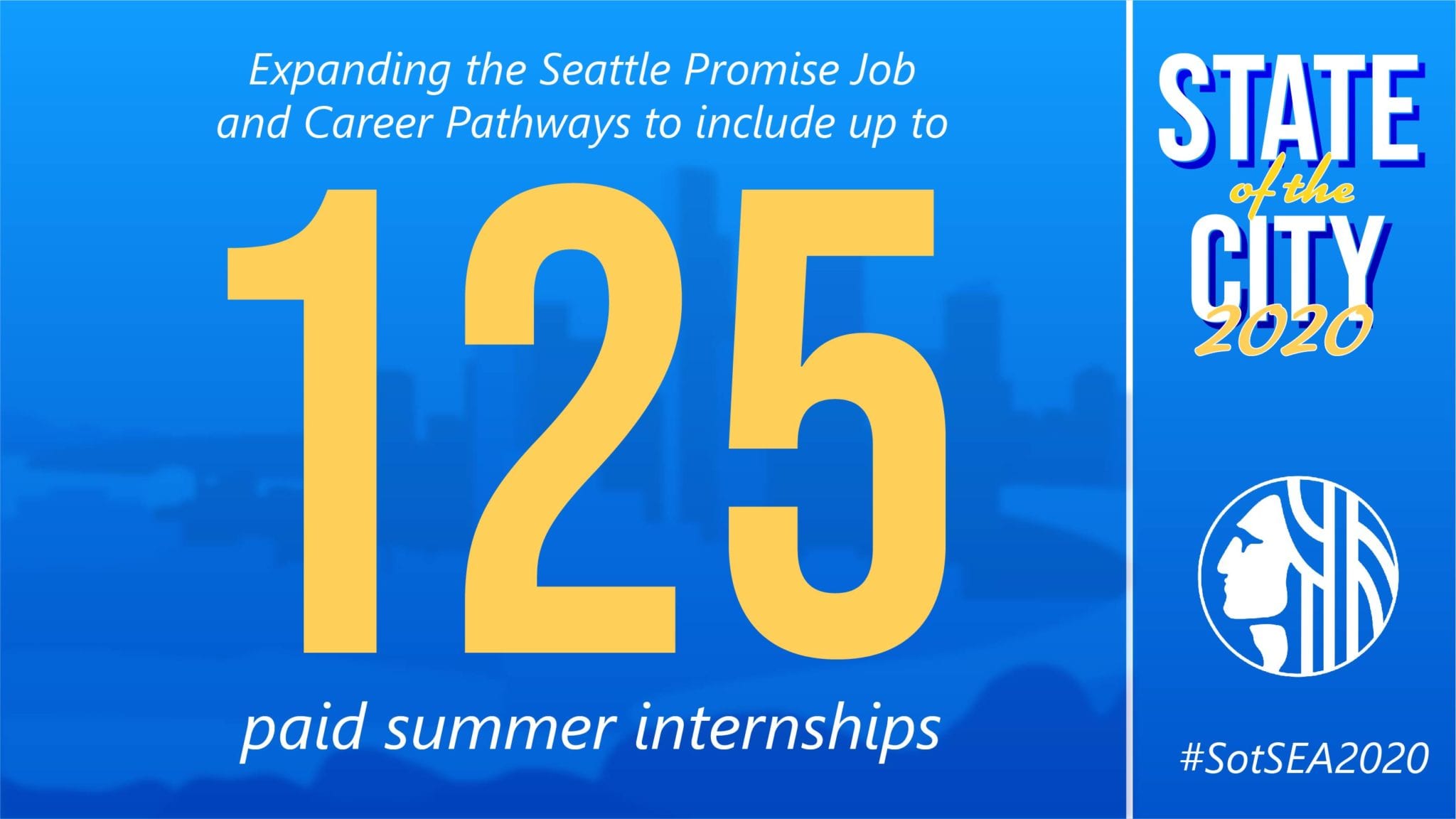
Anthony wasn’t alone.
Shienna Carreon is another one of those people. She couldn’t be here today, but she is amazing
Shienna is a native of the Philippines. She immigrated here in 2014. At first it was tough because she was just learning English when she started high school here in Seattle.
It wasn’t an easy time, but she worked hard and threw herself into clubs at her high school.
And she did really well.
Our Seattle Promise program made college a reality. She enrolled at Seattle Central, tuition paid, and is pursuing a degree in business.
And last summer, she took advantage of our program and did a paid internship at Alaska Airlines.
After she earns her Associates Degree, she plans to transfer to UW to earn her four-year degree.
And I have a feeling one day we may see her running Alaska Air.
Because of the success of this jobs pilot, this year we are going to quadruple the size of this program. We will launch Seattle Promise Job and Career Pathways. We must provide opportunity to every youth living in Seattle.
We want every student to have the opportunity that Anthony and Shienna have had.
Just like we needed to build opportunity for our youth, we also know that we need to do more for others in Seattle.
This includes the largest sector of the gig economy – our Uber and Lyft drivers.
This year, we will make sure they are paid at least a minimum wage and have access to the benefits they deserve, like paid sick leave.
We will also launch a first-in-the-nation model for dispute resolution to provide fairness for drivers who are denied the opportunity to work.
Now, we cannot build shared prosperity without helping, nurturing and encouraging our small businesses.
Here in Seattle, small businesses provide nearly 200,000 jobs.
200,000 jobs. That’s like four Amazons.
They are one of our most powerful economic engines.
That’s why within days of becoming Mayor, I created the City’s first-ever Small Business Advisory Council. We have to make sure the voices of small businesses are heard in City Hall and beyond.
Working with those small business owners, I asked the City to study some specific ways that we could break down barriers for Seattle’s small businesses and help them in this growing and unaffordable city.
We need to help small businesses like Muy Macho, my favorite taco truck in South Park.
It’s owned by Judith Herrera. She’s not here today, but she is awesome.
If you haven’t been there, here’s free advertising: Go!
For years, Judith has been running this amazing small business that is such an important part of the south park community.
But last year, Muy Macho faced some hard times.
Fortunately, the City was able to help.
Judith qualified for a $25,000 grant through our emergency Stabilization Fund, so she could replace her coolers and keep serving her customers and get the business back on track.
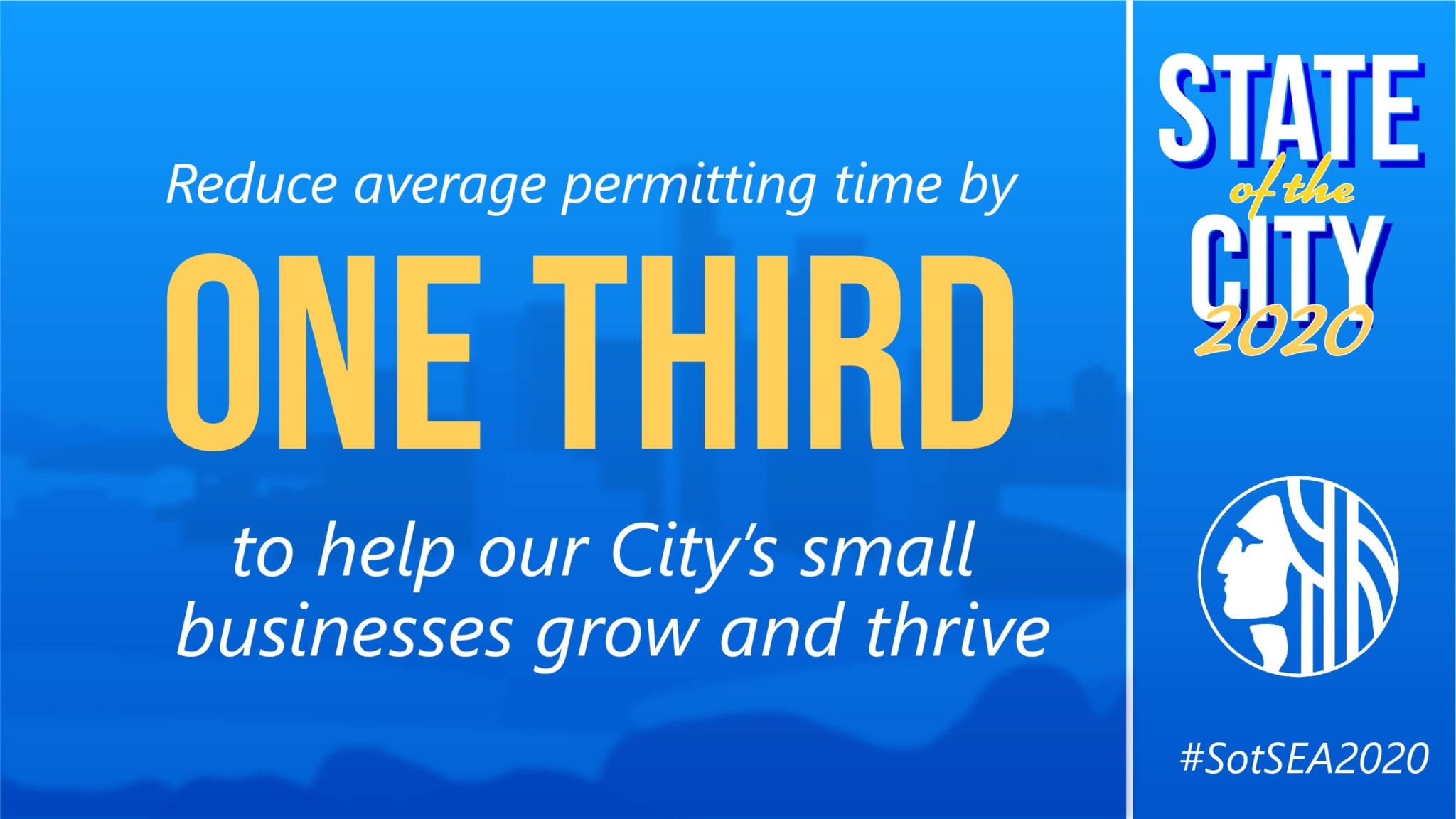
Today, I can announce that the City of Seattle will take new steps to support our small businesses.
First, we are going to increase that emergency fund for small businesses so we can help people trying to make their way here in Seattle.
Second, we are going to speed up permitting.
I’ve heard it too many times: How much it costs and how long it takes.
We are going to cut the time it takes for a small business to get the permits they need.
And finally, we are going to streamline their costs, starting with the fees we charge for something that is important to every business: A storefront sign.
As I said, standing up for our progressive values is not always easy, but it has never been more important.
Few areas in our national life are more disheartening than how this federal administration treats and demonizes immigrants: Separating children from parents. Denying food and basic needs. Replacing hope with fear for our DACA youth.
On this, our voices must be united and unwavering.
We will continue to welcome our immigrant and refugee neighbors into our communities – and we will make sure that our economy works for them, too.
There are so many reasons, we want people to come out of the shadows and thrive in our city.
Consider for a moment the 2020 Census.
A fair and complete count could mean significantly more federal resources for Seattle.
For programs like Head Start, nutrition assistance, and Medicare and Medicaid.
Last year, we worked with our partners to invest millions of dollars in trusted community organizations like Refugee Women’s Alliance and the Asian Counseling and Referral Service and so many more to make sure all communities could be counted.
We must thank all these community partners for their work.
At the City, we know we can and will do more.
So this Spring, at community centers around the city, we’ll open a number of Census Assistance Center to ensure everyone knows their rights and has the chance to be counted.
To every family, I say to you: You count, and you deserve to be counted.
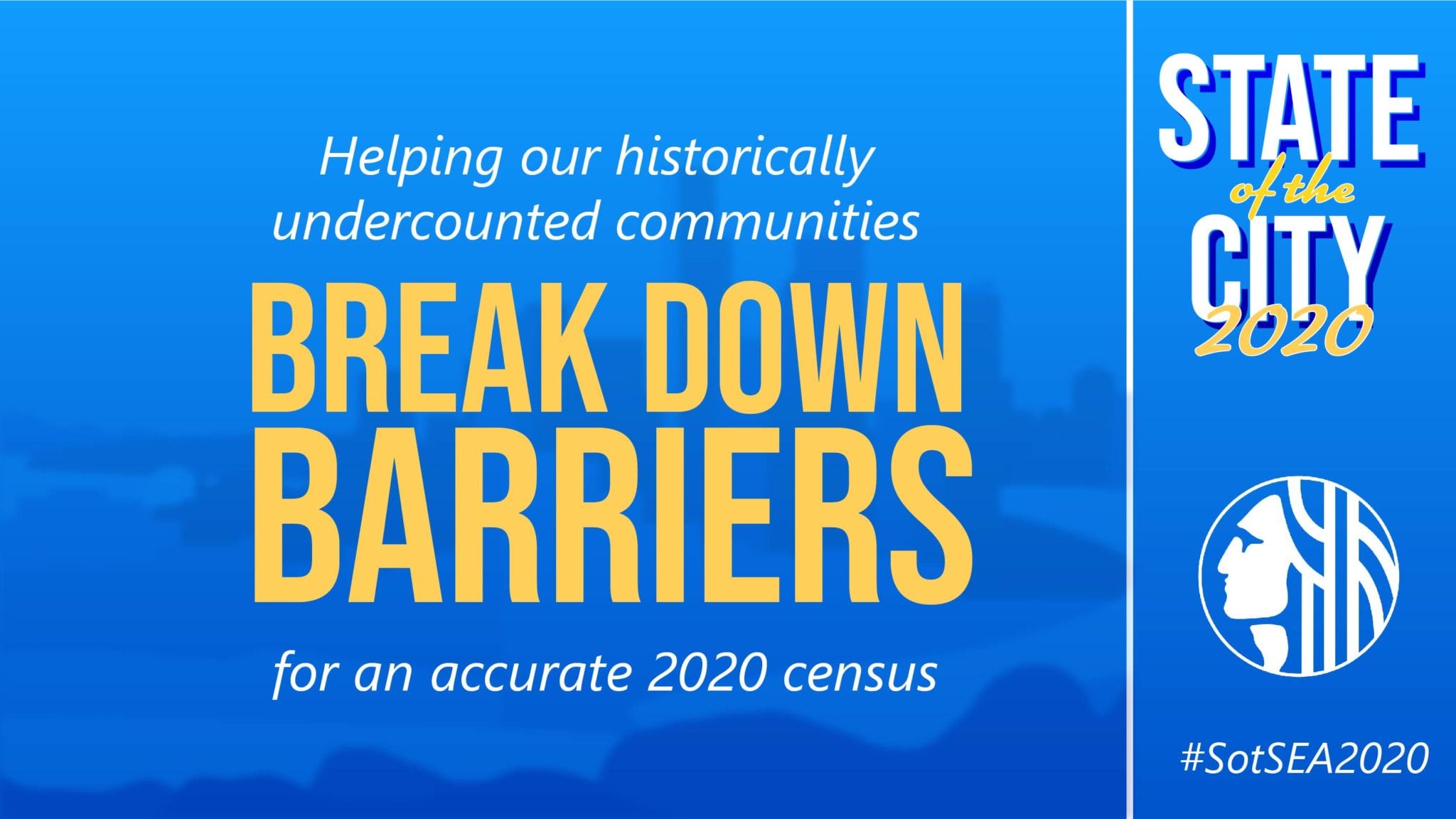
We know one of the fundamental functions of our City government is to provide public safety.
We must do more to increase public safety.
But to achieve that, we can’t act like the other Washington: We can’t create false choices if we really want to achieve holistic community safety.
For many people, increased public safety means more police officers, changing our gun laws, and a criminal justice system that deals better with repeat offenders.
Many others believe we need more economic opportunity for youth, more intervention and diversion programs, and more behavioral health treatment.
My answer is: We need all of the above.
And we are so lucky that we have Chief Carmen Best and Chief Harold Scoggins at the helm of our police and fire departments.
They get it. They understand the challenges of our growing city.
And they are responding.
They know and we know you cannot have true public safety without justice and equity.
That’s why – in addition to historic investments in our police and firefighters we have invested in restorative justice programs that focus on keeping young people out of the criminal legal system in the first place.
Groups like Choose 180.
Rainier Beach: A Beautiful Safe Place for Youth.
The Freedom Project.
The Walk AWay City Collaborative.
The work these organizations and others are doing essential work.
It’s also essential that we continue to increase our community-based policing, which is why we expanded the Seattle Police Department’s Community Service Officer CSO program.
We want to build stronger connections with residents and businesses in every community, not just when there is an emergency call.
I’ve had the chance to go out and walk with these CSOs. They are great additions to the City of Seattle team.
Many of them are here today. Welcome.
We are also working to fight the drug epidemic.
We are educating people on the real dangers of fentanyl and counterfeit drugs.
And we’re making sure people have Narcan and training, so they can help during an overdose.
We know we must increase our ability to deliver emergency and non-emergency services.
This past fall, we launched our new Health One pilot to help address those non-emergency 911 calls downtown.
We led the nation with Medic One and today, we have one of the best emergency response systems in the country.
But a growing city needed a better way to deal with increasing non-emergency, but important, calls.
So Health One was born.
This team of specially trained Seattle Fire Department members and social workers helps people downtown with behavioral health issues and non-emergency medical issues.
The Health One Unit includes two firefighters, Roger Webber and Matt Jung, and two case managers, Ashley Clayton and Donna Andrews.
Some of them are here today. I think we should give them a hand.
Every day, the team answers the call to help those in need.
One day last Fall, Health One responded to a call woman who was found shivering on the sidewalk but could not hear.
The crew wrapped her in blankets and communicated to her in sign language.
Health One took her to a shelter, and then, connected her with a stabilization program.
They are literally doing life-saving work. Thank you.
I’m very pleased to announce today that this summer we will launch a second Health One to expand service within the City of Seattle.
Seattle must continue to lead in taking action to make our communities safer from gun violence.
That’s why we put into place a new gun safety law, and it’s why last year, Chief Carmen Best and her officers at the Seattle Police Department often working with hard with the City Attorney’s Office and King County Prosecutors Office took more than 1,100 guns off our streets.
Still, we know that too many of our communities have been shattered by gun violence.
3rd and Pine.
Lake City.
Pritchard Beach.
South Park.
Like so many of us, I am heartbroken by this violence.
We cannot have community gathering places become places where people fear gun fire.
And we know that there has been an increase in gun violence that’s related to gang activity.
To counter this, we must continue to have better prevention and intervention.
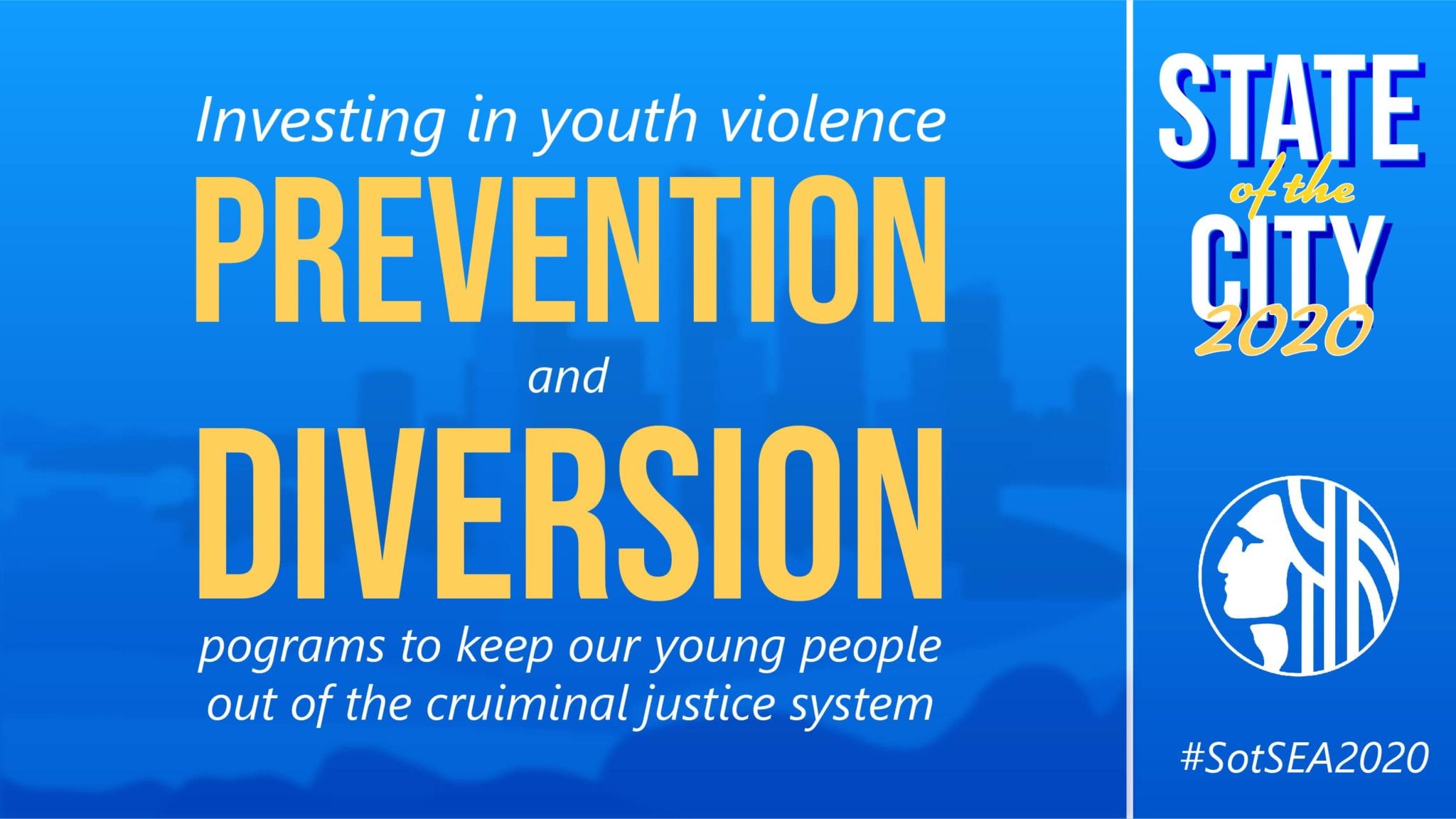
Support the work of our police.
Change our gun laws at the state and federal level.
And continue to have the resources and coordination needed for a predictable and accountable criminal justice system.
As Chief Best and the City continues to increase public safety downtown and everywhere in our City, we also have to be willing to try new things.
Today, I can announce that as part of our comprehensive approach to public safety, we are investing in a new community response program.
While the police investigate a scene, and police and fire keep people safe and arrest offenders, we will also have a new parallel community response.
This new program will dispatch trained, trusted community members to respond immediately after a shooting, to hospitals, to neighborhoods, or hot-spots.
Their goals will be to calm tensions, support families and survivors, and stop these situations from escalating into retaliation or further acts of violence.
This approach has been effective in cities like Atlanta and Philadelphia. Let’s try it here in Seattle and to see if it can make it better.
So yes, we will continue to address our public safety challenges in every community in our City.
Holistically.
We can and we will do it better.
Our progressive values must not only be reflected in our laws and policies.
They must be reflected in how we build our City.
In this 21st century, America’s cities must be livable, vibrant, and connected places.
And here, we are making great progress.
We are adding density, particularly around transit.
And we are adding green spaces and public spaces.
Just look at our waterfront:
Step by step, we are reconnecting our city with our heart: Puget Sound.
We are creating a true Waterfront for All with a 20-acre park for everyone in Seattle to call home.
And Seattle Center is being reborn before our eyes.
In the shadow of the Space Needle, a new, world-class arena is taking shape.
It will be a home to our three-time WNBA champion Seattle Storm.
A new NHL team will compete at Seattle Center, and practice at a reborn Northgate.
The best artists in the world will perform at the new arena.
In fact, Ben, I bet you that some of the amazing kids performing on this stage today will perform there, too.
But we know these civic treasures will mean little if we don’t continue to address climate change.
In Seattle, we continue to believe in science.
We know we must make progress on tackling climate change.
Ans that’s why this year starting our Youth Council, acting on our Climate Action Plan, and prioritizing the goals of the Green New Deal will happen
That’s why I issued an Executive Order making sure the City of Seattle will never again construct a building that relies on fossil fuels.
We will lead by example and we will end our dependence on fossil fuels in our lifetimes.
We are making Seattle a place where your first choice can be taking transit, biking, walking, or rolling.
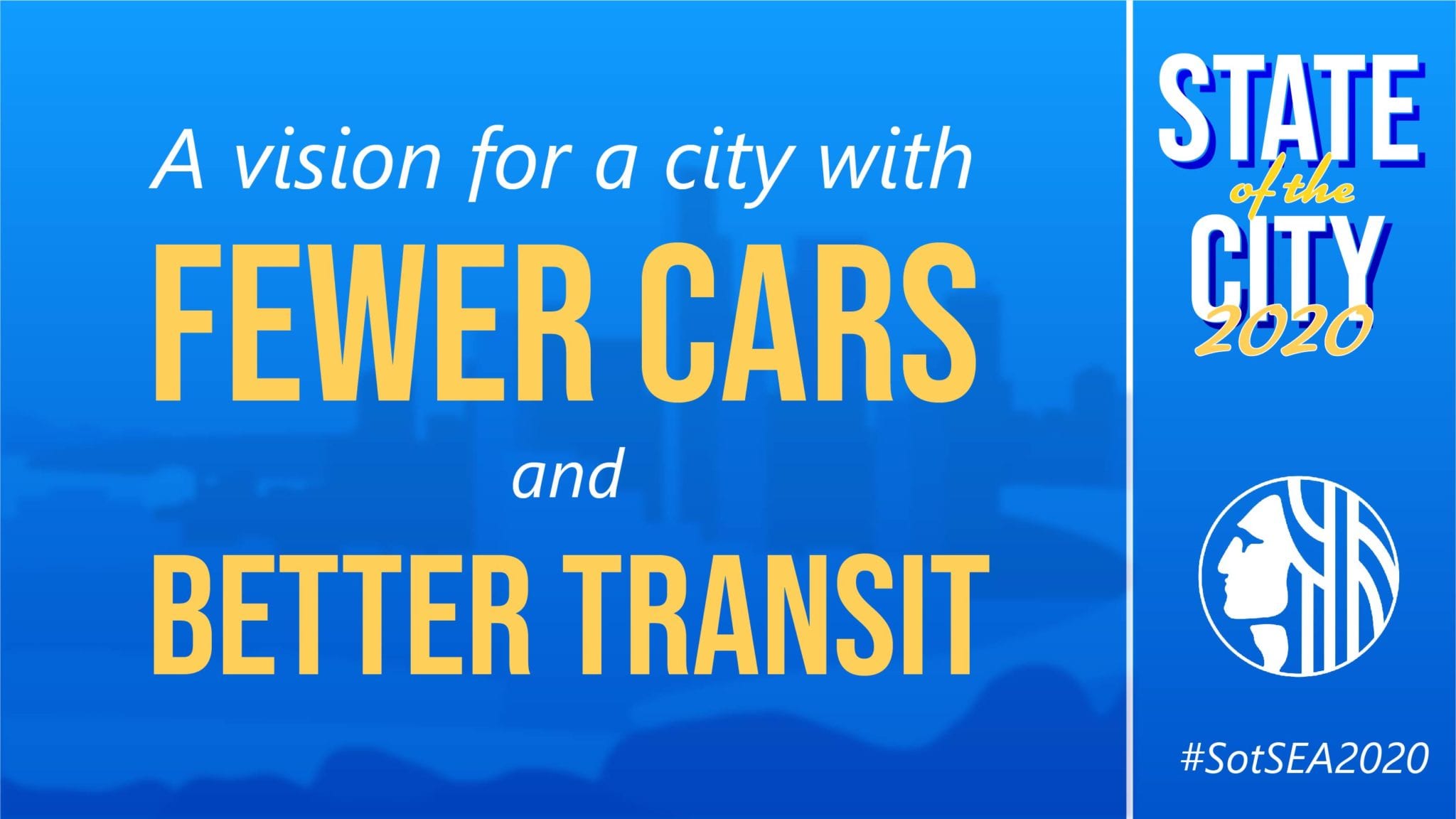
We are building a safer, and more connected bike network.
And we are reducing speed limits on our streets to make them safer for everyone.
Not just because it helps us meet our climate goals.
But because it makes Seattle more affordable, more accessible, reduces congestion, and gives people real choices.
Today, Seattle is a leader in transit ridership.
The reason is because are making investments that we need: We put a free ORCA card in the hands of every Seattle public high school student, and we have expanded free ORCA for our low-income neighbors.
We are working to bring more Sound Transit light rail online as quickly as possible.
We have increased our Metro bus service by 32 percent over two years.
A big piece of the puzzle has been the success of the voter-approved Seattle Transportation Benefit District.
Thank you, voters.
This year, the law – and the support for transit that it provides – will expire.
So we will go back to the voters to secure reliable funding for transit, red bus lanes, and to maintain free ORCA for all our students and our low-income neighbors.
In the coming weeks, I’ll present my plan for how we can continue that commitment to transit.
Because we have a vision for the future for Seattle and our region: A region where you never have to get in a car to work, to play or explore this great city.
A region that gives seniors, people with low-incomes, our neighbors with disabilities, and young people access to jobs and education.
A region with fewer cars, less climate pollution, and more safe and convenient ways to get around.
We will show we believe in this future. And together we can act and make progress.
Now, Seattle has always been an optimistic, forward-looking city.
We are that city that invents the future.
And in these challenging, divisive times, the obligation to keep making progress, real progress, has never been greater.
As we look at the year ahead, I believe we can seize opportunities before us.
After all we’ve done together in the last two years, how could I not believe?
We can keep showing what it looks like when progressives make progress.
In this era of division, we can show people how to can come together to do the big, hard things.
We can show the power of kindness, love, and compassion. As Heather said, let’s open our hearts.
In this era of distrust of government, we can restore trust by showing real progress, real results and making lives better.
This year, together, let’s recommit to doing that doing just that. Let’s build that better Seattle together.
Thank you so much, Seattle.
Now go get it done!